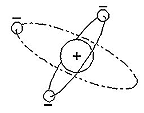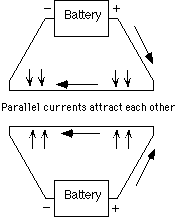|
|
Out in space there is no magnetic iron, yet magnetism is widespread. For instance, sunspots consist of glowing hot gas, yet they are all intensely magnetic. The Earth's own magnetic powers arise deep in its interior, and temperatures there are too high for iron magnets, which lose all their power when heated to a red glow. What goes on in those magnetized regions? It is all related to electricity.
|
 Matter consists of electrically charged particles: each atom consists of light, negative electrons swarming around a positive nucleus. Objects with extra electrons are negatively (-) charged, while those missing some electrons are positively (+) charged. Such charging with "static electricity" may happen (sometimes unintentionally!) when objects are brushed with cloth or fur on a dry day. Experiments in the 1700s have shown that (+) repels (+), (- ) repels (-), while (+) and (-) attract each other. |

|
--Two parallel currents in the same direction attract each other. --Two parallel currents in opposite directions repel each other.
|
|
>
|
--Two circular currents in the same direction attract each other. --Two circular currents in opposite directions repel each other.
|
Next Stop: #2H. History
Author and Curator: Dr. David P. Stern
Mail to Dr.Stern: education("at" symbol)phy6.org
Co-author: Dr. Mauricio Peredo
Spanish translation by J. Méndez